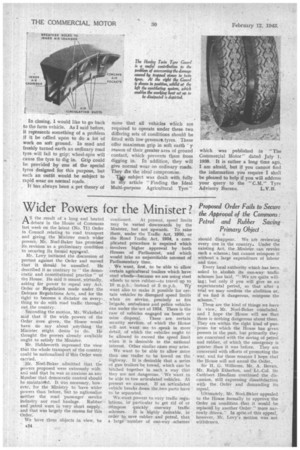Wider Powers for the Minister?
Page 26

If you've noticed an error in this article please click here to report it so we can fix it.
Proposed Order Fails to Secure the Approval of the Commons: Petrol and Rubber Saving Primary Object .
A S the result of a long and heated debate in the House of Commons last week on the latest (No. 71) Order in Council relating to road transport and giving the Minister much wider powers, Mr. Noel-Baker has promised its revision as a preliminary condition to securing its formal apprqval.
Mr. Levy initiated the discussion of protest against the Order and moved that it should be annulled. He described it as contrary to "the democratic andconstitutional practice " of the House. He said it meant, virtually, asking for power to repeal any Act, Order or Regulation made under the Defence Regulations Acts, and for the right to become a dictator on everything to do with road traffic throughout the country.
Seconding the motion, Mr. Wakefield said that if the wide powers of the Order were given, the House would have no say about .anything the Minister might desire to do. He thought the powers already available ought to satisfy the Minister, Mr. Holdsworth expressed the view that the whole transport of the country, could be nationalized if this Order were carried.
Mr. Noel-Baker admitted that the powers proposed were extremely wide, and said that he was as anxious as any Member that democratic control should be maintaintd. It was necessary, however, for the Ministry to have wider powers than before, but to naxtionalize neither the road passenger service industry nor road haulage. Rubber and' petrol were in very short supply, . and that was largely the reason for this Order.
We have three objects in view, be continued. At present, speed limits
may be varied downwards by the Minister, but not upwards. To raise them, under the Traffic Act, IWO, or the Road Traffic Act, 1934, a complicated procedure is required which involves higher approval by both Houses of Parliament. and which would take an unjustifiable amount of Parliamentary time, We want, first, to be able to allow certain agricultural trailers which have steel wheels—because we are using steel Wheels to save rubber—to travel.up to 10 m.p.h., instead of 5 m.p.h. Wp want also to make it possible for certain vehicles to disregard speed limits when on service, precisely as fire brigade, ambulance and police vehicles can under the act of 1934. There is the case of vehicles engaged on bomb or mine disposal. There are certain security services, of which the House will not Want me to speak in more detail, of which the vehicles ought to be allowed to exceed the speed limit when it is desirable in the national interest. Other similar cases may arise.
We want to be able to allow more than one trailer to be towed on the highway. It is desirable that a series of gun trailers be towed, which can be hitched together in such a way that they are not dangerous. We 'want to be able to tow articulated vehicles. At present we cannot. If an articulated vehicle breaks down the.two parts have to be separated.
We want powers to vary traffic regulations, in particular to get rid of or reimpose quickly one-way traffic schemes. It is highly desirable, in order to save rubber and petrol, that a• large number of on-way ,schemes should disappear. We are reviewing every one in the country. Under the existing Act, the Minister can revoke such a scheme; but cannot reimpose it without a large expenditure of labour and time, Every local authority which has been asked to abolish its one-way traffic schemes has Said, " We are quite willing; but only if you will give us an experimental period, so that after a trial we may confirm the abolition or. if we find it dangerous, reimpose the scheme."
These are the kind of things we have in view, Mr. Noel-Baker concluded, and I hope the House will see that there is nothing dangerous about them. They are within the right kind of purposes for which the House has given powers in the past, but primarily they are concerned with the saving of petrol and rubber, of which the emergency is greater than it was before. They are concerned with efforts of promoting the war, and for these reasons I hope that the House will not annulthe Order.
Sir H. G. Williams, Mr. A. Bevan, Mr. Ralph Etherton, and Lt.-Col. Sir Cuthbert Headlam continued the discussion, still expressing dissatisfaction with• the Order and demanding its repeal.
Ultimately, Mr. Noel-Bhker appealed to the House formally to approve the Order on condition that it would be replaced by another Order " more narrowly drawn." In spite of this appeal, however, Mr. Levy's motion was not withdrawn.




























































